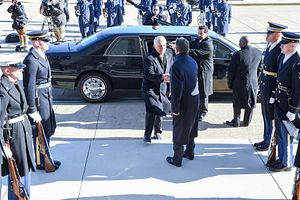Australian Prime Minister Malcolm Turnbull is in the United States, his first visit to the major Australian ally since taking office in September 2015. He began his visit on Monday, meeting U.S. Defense Secretary Ashton Carter at the Pentagon. On Tuesday, he headed to the White House for talks with President Barack Obama in the morning, followed by discussions with members of Congress in the afternoon.
Much of the discussions with U.S. leaders focused on Australian-American cooperation in the fight against Islamic State. Under previous Prime Minister Tony Abbott, Australia joined in U.S.-led airstrikes against Islamic State in both Iraq and Syria. But, when Turnbull replaced Abbott in a Liberal Party leadership spill, there were questions as to whether the new prime minister would have the same appetite for military operations in the Middle East.
Less than a week ago, Australia declined the United States’ request for all countries in the campaign against Islamic State to step up their efforts. Australian Defence Minister Marise Payne* said Canberra made the decision “in light of the substantial contributions we are already making to train Iraqi security forces and to the air campaign.”
The United States took care to recognize those contributions, with the White House saying it “deeply appreciates Australia’s tremendous support to the Counter-ISIL Coalition.” As Obama noted in remarks with Turnbull, “[I]n our fight against ISIL, Australia is the second largest contributor of troops on the ground after the United States.”
Turnbull invoked the need for caution in the use of force through some heavy symbolism. He visited the Tomb of the Unknown Soldier in Arlington Cemetery before heading to meet U.S. defense officials, effectively preceding those conversations with a reminder of the costs of war. And before that, Turnbull was in Iraq and Afghanistan, visiting the troops carrying out the assaults on Islamic State.
“Our countries know too well that the costs of war stretch for decades and that every decision to deploy our troops comes with the contract to care for them and their families,” Turnbull said in remarks at the Center for Strategic and International Studies in Washington, D.C.
Yet he also mentioned that Americans and Australians have fought together “in every major conflict since the First World War.” Both nations “are prepared to pay freedom’s terrible price,” Turnbull said, but doing so involves not just putting “boots on the ground… they must be the right boots on the right ground.” Turnbull also focused on the use of counter-terrorism and cyber operations to counter Islamic State more effectively.
Besides the fight against Islamic State, the two sides naturally touched on Asia-Pacific related issues during Turnbull’s visit, including the U.S. “rebalance to Asia” and the Trans-Pacific Partnership, a mammoth, 12-country free trade agreement spearheaded by the United States. Interestingly, though,“China” was not mentioned once in either Turnbull or Obama’s remarks at the White House (although an outline of their shared position on the South China Sea made it into a White House “fact sheet” on U.S.-Australian cooperation).
After discussing the fight against Islamic State and violent extremism at length in his CSIS speech, Turnbull moved on to the economic miracle of the Asia-Pacific region – and argued that “the pace and scale of economic growth in our region … would not have happened, and its continuance cannot be assured, without the security and stability underwritten by a strong and enduring United States presence in our region.” He tied the TPP directly to the maintenance of the U.S. presence and leadership in the region, calling the agreement “much more than a trade deal.”
This view of the centrality of the U.S.-led order is central to Turnbull’s views on China. “The preservation of the international order and the peace that it brings has been a consistent and absolutely central objective of both the United States and Australia,” he said. Turnbull also urged China, if it truly wishes to avoid the Thucydides Trap, to take care not to make destabilizing moves, particularly in the South China Sea. “[I]f avoiding the Thucydides Trap is a core objective of China’s strategy,” he said, “[…]then we would hope that China’s actions would be carefully calculated to make conflict less likely, not more, and would seek to reassure neighbors of and build their confidence in China’s intentions.”
On the South China Sea disputes, then, as well as the underlying question that particular issue poses for the impact of China’s rise on the international order, Turnbull invoked strong U.S.-Australia cooperation based on their shared values. Yet, as in the case of the fight against Islamic State, Australia’s strategy for defending those values may not perfectly align with the United States’. Witness, for example, Australia’s much quieter strategy for practicing freedom of overflight in the South China Sea.
*Corrected. The original called Ms. Payne a “spokeperson.”

































